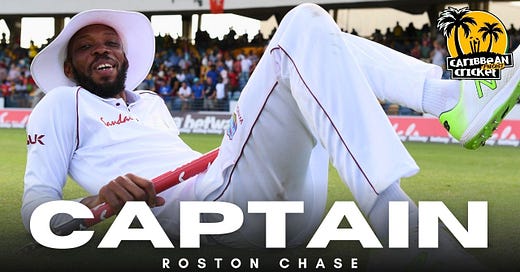When it comes to captaincy, it feels as though the region is in disarray. Only a couple of weeks ago, T20I captain Rovman Powell was controversially replaced by ODI skipper Shai Hope. At the same time, although Kraigg Brathwaite’s resignation from the Test captaincy role was long expected, the question of his rightful successor has cast a long and uncertain shadow. The field feels unusually barren.
This has stirred the metaphorical dal pot, bringing about one of the more tumultuous moments in recent CWI memory. Every uncle, nephew, and wannabe cricket journalist has weighed in on the conversation, and now, so will I. But allow me to take a different approach.
Six players were interviewed for the role of West Indies Test Captain: Joshua Da Silva, Tevin Imlach, Roston Chase, Jomel Warrican, Justin Greaves, and John Campbell. With the near future of West Indies cricket in mind, none of those names spark any joy or hope in me. I could state my opinion on why each of them is not fit to take on the role, but every voice in the region has already published a video or an article discussing that. So rather than debate who among them deserved the nod, I want to explore what the role actually requires. What are the qualities, histories, and responsibilities that define West Indies captaincy, and what standards should any new leader be held to?
The Weight of History: Contexts That Still Matter
Eras come and go, but West Indies cricket maintains the legacy of the badge. Captaincy in the region is not just about the strategy on the pitch or which of our friends and countrymen get selected. The leader of the team bears the weight of the ancestors. It’s an inheritance — a political, cultural, and symbolic torch passed through generations. The eyes of Daren Sammy, Viv Richards, Clive Lloyd, Frank Worrell, and many more are all looking on to see how their legacies are treated.
From Colonial Shadows to Political Symbols
Early captains like George Headley and Sir Frank Worrell faced the impossible task of legitimising a West Indian identity on the world stage, all while representing a colonial structure built to undermine that very identity. Their exploits on the field were often less about winning cricket matches and more about asserting presence, proving that the Caribbean man could lead, think, and conquer on his own terms. In many ways, they sparked or accelerated the region's drive toward independence.
Clive Lloyd’s Dynasty
Then came Clive Lloyd, arguably the archetype of West Indian leadership. He didn’t just lead, he constructed an empire. With tactical acumen and a quiet, commanding aura, Lloyd turned a fragmented collection of talent into the most feared team in the world. He harnessed a regional identity that echoed far beyond sport, confronting global racial dynamics at a time when South Africa remained under apartheid and India had yet to fully stake its claim in global cricket.
Viv Richards: The Defiant Face of Caribbean Pride
Viv Richards, meanwhile, marked a turning point. His captaincy was less about diplomacy and more about declaration. Swaggering, brilliant, and unwavering, he demolished the old colonial template of servitude. His leadership embodied Caribbean pride — an attitude, not just a strategy.
Modern Captains in a Modern Chaos
Recent captains, like Darren Sammy, Jason Holder, and Kraigg Brathwaite, operated in a wildly different landscape. Colonialism has taken on new forms in neo-colonialism. They fly in the face of foreign leagues pulling players away, foreign boards twisting their selection policies to entice West Indians away from their home soil, internal board dysfunction, and an erosion of regional structures that once developed greatness. These modern leaders don’t just fight on the pitch, they wrestle with contract disputes, burnout, and an increasingly disengaged fan base.
The Essential Qualities of a Good West Indies Captain
The order may vary by who you ask, but for most West Indies fans, young and old, the following attributes form the foundation of true leadership.
1. Diplomatic Intelligence Across Island Lines
The West Indies is a region masquerading as a single team. The captain must navigate cultural rivalries, like the Guyana vs Trinidad banter and the Big Island vs Small Island perceptions, and foster genuine unity. The ability to connect with and manage players from a dozen different backgrounds is arguably more crucial than field placements or toss decisions.
2. Elite Man-Management in a Team of Egos
West Indian cricketers have always had bold personalities and it’s part of what makes them great. But when that fire turns inward, it can consume the dressing room. A good captain must channel those egos, refocusing frustration into performance. Failure to do so, such as the incident with Alzarri Joseph storming off the field during the England series — allegedly due to Shai Hope ignoring his preferred field — becomes an indictment of the captain and the player environment they’ve created. It speaks to a lack of cohesion, and by extension, ineffective leadership.
3. Communication Mastery (Especially with Media)
Public perception matters more than we like to admit. It can shoulder the brunt of losses and keep the fanbase perpetually on your side. Jason Holder, for example, thrived in the public’s perception despite the trail of failures and lousy performances that followed him.
He still managed to earn the region’s admiration through calm, articulate press conferences and emotionally grounded interviews. He was a politician, a diplomat, and a statesman in white.
By stark contrast, Nicholas Pooran often sounded flippant or disconnected during post-match interviews, which only added fuel to public criticism. In a region where cricket is intertwined with national identity, the captain must be fluent in the languages of sport, politics, and people.
4. Resilience Without Delusion
There was once a time when captains were expected to average 50, score double hundreds, or take a five-for on demand. Unfortunately, that time is gone, and I may never see it return in my lifetime. The memory of a decade-dominant West Indies side may very well die with my father. What we have now is an institution that is no longer conducive to producing acceptable test players. This means the modern captain needs to embody pragmatic resilience.
It may sound like heresy to say this, but in today's West Indies, it’s unreasonable to demand that a captain lead from the front statistically. We'd all love a 60-average behemoth, but literally none exist, active or not. Realistically, the bar has shifted, and that's okay; just be consistently decent, and don't become a liability. That alone can provide the kind of example this team needs. Many fans will say that even this is asking too much.
Why the Captain Matters More Than Ever
In most other cricketing nations, a captain operates in the safety net of a robust system with strong domestic leagues, professional boards, and pipelines of talent. In the West Indies, however, that safety net barely exists.
The captain becomes the de facto bridge between chaos and coherence. They shield players from administrative madness. They sell hope to a sceptical fan base. They represent not just a team, but the region's self-worth.
That’s why West Indies captaincy will always carry more weight and scrutiny than perhaps any other captaincy in sport.
Conclusion: A Leader for Our Time
So, what do we really want in our next West Indies captain?
We want someone who understands the political legacy of Worrell and Headley, who channels the unifying power of Lloyd, who embodies the pride of Richards, and who navigates the instability of the present with the grace of Holder or the grit of Brathwaite.
But we also need to be realistic. The golden age is over, at least for now. We’re not looking for a saviour, we’re looking for a stabiliser; someone who will stop the bleeding, unite a scattered group, and help us rediscover purpose. This will be not just a leader of eleven men, but of a complicated, passionate, wounded region.
The next West Indies captain won’t be perfect, but if they are honest, hard-working, and unafraid to lead with their chest, we will rally behind them. Because here, leadership is not about lifting trophies, it’s about lifting belief.
Thank you to Steph Jaggassar for her article you can find her on Substack - here
The Caribbean Cricket Podcast is on Facebook and of course you can also find us on X and Instagram.
If you'd like to support the Caribbean Cricket Podcast you can become a patron for as little as £1/$1 etc a month - Here






Informative article, very nicely structured and written. West Indies have an enormous job on their hands to bring back even a semblance of those glory days. If even England, which has to have been the most structured cricket country in the history of the game, is wrestling with the task of focusing players' minds on Test cricket with the riches available elsewhere, where do West Indies start. I wonder how Clive Lloyd or Viv Richards might have handled players having their heads turned by franchise cricket. Maybe the force of their personalities and respect for the meaning of West Indies cricket would have kept the wayward in line; maybe they themselves would have been tempted, though I doubt it. I guess there's always been an imbalance in resources but the imbalance is now so stark - and the so-called Big Three are so disinclined to do a great deal about it - that other countries, which have blessed the world with some of the greatest players to grace the game, are being totally left behind. There is possibly an analogy with the ECB happy to sideline the poorer counties in the County Championship, maybe in the hope that some will perish. I am always struck, every time England play West Indies (this also applies somewhat to Sri Lanka and Pakistan) by what seem to be rather haphazard selections. It's hard to know who's in or out of favour, who's away playing in a franchise league because that's basically all they do, who's away playing for a franchise team before they rejoin the national team and who of those are considered T20 and/or ODI specialists or are foremost long-form players. Such a turnover defies any hope of stability. Even during West Indies decline, they have produced some excellent cricketers and you rightly revere Jason Holder for his qualities, though I suspect he must have suffered burnout in the past or be close to it now. How strange and almost perverse it was last night (first T20 in Durham) to see a man who led from the front with a stunning double hundred in Test cricket against England, left to bat at No 10 in the shortest form. However, I think it unlikely, now, that you will find a captain to embody the qualities you suggest are required in that position. I suspect the combination of off-field responsibilities with cricketing and leadership skills on the pitch you seek are unlikely to appear more than once in a generation and the modern world seems to work increasingly against development of those abilities. I am not a deep follower of West Indies domestic cricket but is it also significant that of those listed as potential Test captains, I had never heard of one and I absorb a lot of international cricket and whatever else my ageing brain has room for!